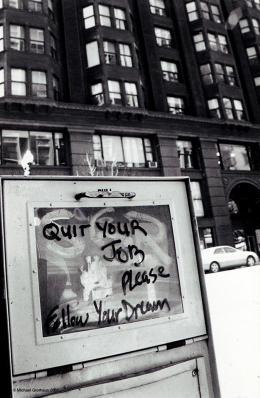How I Quit My Job And Finally Wrote That Novel
It’s often been said that everyone has one novel in them—and the thing that separates novelists from everyone else is that they have multiple novels in them. That, and novelists are willing to sacrifice their time, social life, and often part of their sanity to put their words to the page. But as I’ve found, it’s not just sacrifice a novelist must embrace to write that novel and get it published.
Like any dream venture, whether it’s writing a novel or launching a startup, there is a large amount of risk involved. It’s often the fear that risk brings—How will I find the time? How will I pay the bills? What if I’m no good and don’t succeed?—that keeps people chained to careers they may, at best, tolerate and at worst, detest. Those risks can be minimized, those fears overcome, and your dreams could actually come to pass, if you plan well and keep your self-doubts under control.

How do I know? Because today I’m a published novelist and it would never have happened if I had not had the courage (or, as plenty of my family and friends told me at the time, stupidity) to leave a six-figure job at the hottest tech company in the world to become (for a time, at least) an unemployed writer.
Because I did, I was able to write my debut novel Epiphany Jones, a story about a porn addict’s involuntary relationship with a woman who says she speaks to God, and their entanglement with a sex-trafficking ring that caters to the Hollywood elite. Not only has it been published worldwide in English, it will soon be translated into other languages, and has even been professionally narrated for an audiobook edition after Audible acquired the rights.
If I can do it, anyone can. What’s more, the steps I took to achieving my dream, and the lessons I learned from my missteps, apply to those of a non-literary variety, too.
Stop Listening To What You “Should” Do
I have a bad habit of quitting jobs that many people would kill for. I blame it all on one photograph I took on Printers Row in Chicago in 2001. It was of a newsstand where someone had scrawled: “Quit your job please follow your dream” in shoe polish. I came across this newsstand on an afternoon walk I took while I was trying to sort out conflicting desires in my head.
At the time I was working for the Art Institute of Chicago, the city’s prestigious art museum. Part of my job entailed writing and directing educational films in order to get children interested in art. My job gave me access to priceless works of art and let me make films using someone else’s money–-and I got paid for it. That’s a pretty cool gig for a 24-year-old.
Yet I had become disillusioned by film. After working for a Hollywood film studio and now making my own films for the Art Institute, I began to question both the goings-on behind the commercial film industry and the supposed power of film to affect change in general. That disillusionment made me question what I was doing with my life.
Perhaps it was time to leave my job and follow a thread of desire I had to move to Colorado to begin a new life as a novelist. Of course, whenever I talked to my friends and family about this, they all told me I should stay right where I was. I should be happy I had a job most people would kill for. I should be satisfied with the life I had, and in no way should I risk it all for an unsure future.
You’ll notice the common word among everyone’s advice was “should.” It’s then that I realized how harmful that word is. “Should” implies an obligation or duty to do something, irrespective of your feelings or desire for change. When people use it in relation to your potential actions, they are usually trying to confine your options to what they, or society, deems acceptable.

I now believe “should” can be the most limiting, harmful word in the world. While your family’s and friends’ suggestions for what you should do may come from a genuinely caring standpoint, it is also a word that, if followed, will forever keep you in a risk-averse mind-set that confines you to the status quo. People afraid to go against the status quo and never take a risk rarely achieve their dreams. People who listen to others’ shoulds are living their lives for those people instead of for themselves. These are people who don’t create the next great tech company, or snap that Pulitzer Prize-winning photograph, or write the next great novel.
With everyone telling me what I should do, those words scrawled in shoe polish on that newsstand were the only support for this burning feeling that told me that if I didn’t have the courage to follow my dreams, I would forever lead a life wondering, “What if?” That would be a life of, as Thoreau said, “quiet desperation.” Those shoe polish words were enough. I decided to quit my job and move to Colorado where my education in literature really began, reading for hours in the shadows of the trees of Boulder’s mountains.
Yet as storybook perfect as that ending is, it wasn’t enough. Ironically, my move to Boulder taught me that simply leaving your past life to follow your dreams is a pretty stupid thing to do if you don’t plan appropriately. When I left my job at the Art Institute, I barely had enough in savings to cover two months’ worth of living expenses. I quickly discovered that while reading weighty novels under the trees is idyllic, you’ll have precious little time for writing if you are constantly trying to figure out how to pay the bills.
Have A Serious Financial Plan
Boulder wasn’t a wasted experience because it indirectly led me to Apple a few years later. Getting a job there pleased all the “should” people in my life because of the pay package. That also allowed me to have a stable income as I regrouped and refined my plans to dedicate myself to novel writing.
The average novel is 70,000 to 90,000 words long. Epiphany Jones is 123,000 words. Writing a novel takes a long time, and one of the most critical steps to finishing is finding a workflow that suits you. For me, that meant taking a few years off from a regular job in order to concentrate on completing it. I also knew that being in an environment with like-minded people who I could learn from fit my workflow. So I decided to pursue a master’s degree in creative writing in London.
But in order to take a few years off work and also pay for a master’s program and have enough money to live, I would need to have a serious financial plan. Though I’m a big believer in taking risk to follow a dream, Boulder taught me to also be a pragmatist and realize that dreams—whether writing a novel or launching a startup—are easier to achieve if you can minimize financial burden.
For me, this meant spending my last few years at Apple saving every penny I could. While many of my colleagues were blowing their increasing stock options and bonuses on new cars, I was throwing my money into paying off every last bit of debt I had. After the debt was gone, I threw all my additional earnings into my savings, amassing enough for two years of living costs and expenses related to my degree program. Then, I looked at that photo of the newsstand again, looked at my bank account, and handed Apple my resignation letter.
Regardless of what dream you want to pursue, preparing a financial plan that covers you for at least a year’s worth of living expenses is an absolute must. That way you have the financial freedom and peace of mind to concentrate on nothing but those dreams for a significant amount of time. If you don’t know where to start on a financial plan, I recommend using Mint to get a complete overview of your finances. Then begin to pay down any debt and start plowing money into savings.
Get Used To Rejection, But Don’t Get Discouraged
Sadly, simply having the courage to take a risk and pursue your dreams and also having a firm financial plan isn’t enough. You also must be able to put up with rejection.
I remember my eighth rejection from a literary agent because it was unbelievably humiliating. I had been shopping the book around for a few months after spending a few years writing and refining it during my master’s program.
I’d gotten several polite rejections from agents like, “The book isn’t a right fit for me” or “It’s not what we feel publishers are looking for at this time, but don’t give up.” Then I received an email from a London literary agent who wanted to set up a meeting. When I arrived in her office the following week, it couldn’t have started any better.
“I want you to know I get thousands of submissions a year,” she said, sitting behind an obscenely large and intimidating desk littered with manuscripts, book proofs, and contracts. “I bin 99% of them. Of the 1% I do read further, I bin 99% of those by the third chapter. So you being here says something about your writing skills.”
So far, so good.
“Now I’m going to trash your novel,” she said. Okay—I was there to get her professional opinion after all, and hopefully a signed contract of representation. The agent proceeded to tell me she thought one supporting character could be cut, a scene here or there could be moved or removed, a section of dialog could be refined.
Fair-enough observations, I thought.
“But I’m going to hold off on it as it stands today,” she finished. “I want to see what you do with these edits.”
I was disheartened, but at least it wasn’t a flat-out rejection. “Anything else?” I said.
“Yeah,” she said. “Get away from your computer and stop looking at porn.”
At first I thought she was joking, making a reference to the novel’s main protagonist, who is a porn addict. But then she said it twice more: “Go out, see the world, stop looking at porn on your computer.”
My mouth hung open. “The book is fiction. It’s not about me,” I said.
But she just laughed and rolled her eyes like I was the biggest liar ever. The only thing that was missing was a patronizing wink as she showed me to the door.
It was humiliating. And as I left I decided I would never send her the edits. Part of me wanted to give up sending the book out to other agents altogether. It hadn’t gone well so far, after all.
But if I would have let that horrible meeting discourage me from continuing to try to find someone who both liked and understood my work, I wouldn’t be published today. The week after that meeting I sent the manuscript to my ninth agent: Maggie Hanbury, a legend in the U.K. publishing industry who’s represented a host of distinguished authors including the great J.G. Ballard, the English novelist whose books include Empire of the Sun and Crash. Hanbury loved the book and my writing, and I signed with her. She sent the book to publishers and sold it.
I only succeeded because I didn’t give up.
When pursuing your dream, rejection is always the name of the game—until one day it isn’t. Most things in life are subjective, and just because one person, or eight, or in the case of these writers, dozens don’t like your work, that doesn’t mean no one ever will. But you’ll never find the people who do love your work if you give up looking for them.

Believe One Day You Will Find All The Struggle Worth It
Which brings me to this last bit of advice. It sounds cliche, but the most important step I took, and the reason I’m published today, is because I believed in myself. I believed I could write well. I believed I had a story that would resonate with people and one that was worth telling.
Had I not had this belief in myself, I would not have had the courage to risk leaving a stable job (twice), the willpower to eschew material things and save the money needed to complete my goals, or the fortitude to put up with rejection after rejection.
Unfortunately, and unlike the steps above, I can’t tell you how to believe in yourself. All I know is you should. And if I can do it, then I’m sure as hell you can too.
When I see my book get a positive mention in a national newspaper, or a great review on a book blog, or have readers come up to me at literary festivals and tell me how much my novel moved them, I look back and smile on all the struggle it took to get here. I realize that despite not knowing it at the time, I made the right choice in pursuing my dreams. Even if I hadn’t succeeded, I wouldn’t have regretted my attempts to achieve my dream. I would have regretted never trying.
Michael Grothaus is currently working on his second novel. His debut novel Epiphany Jones is published by Orenda Books. It can be found in all good bookshops and on Amazon (U.K., U.S.) in print, and in digital on iBooks and Kindle. The audiobook is available from Audible.
Fast Company , Read Full Story
(24)













